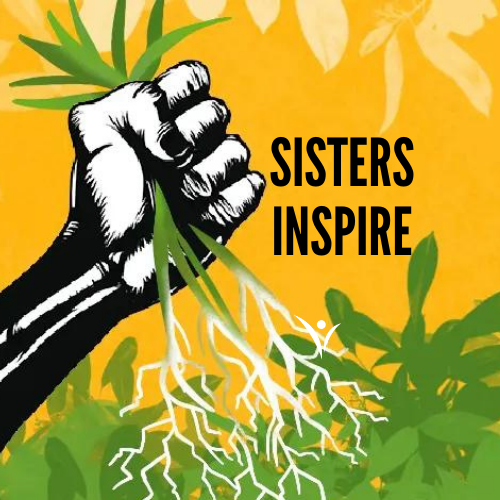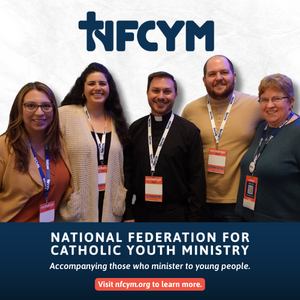When Catholic Volunteer Network’s co-founder, Pat Mader Stalker, sought an experience of faith and service nearly 60 years ago, she looked to the Mission Helpers of the Sacred Heart. Her experience of encounter and transformation, bridging mission, charism and lay partners, eventually led to CVN. CVN’s origin story illustrates that Catholic Sisters have always been at the leading edge of faith-based service. Now, as many in our communities recognize systemic racism as a barrier to acknowledging the life and dignity of each person, three Sisters-sponsored volunteer programs are leading our network’s efforts to re-center equity and justice.
What is Catholic Volunteer Network’s “Sister INSPIRE?”
Sisters INSPIRE, a pilot project funded by the Conrad N. Hilton Foundation, aims to disrupt the white dominant cultural narrative embedded in community service and uplift models of faith-based service rooted in racial justice and community partnership. Featuring a Sisters Leadership Cohort, the project was created to cultivate space for participants to deepen their practice and assessment of racial justice and diversity strategies, in community.
The Formation of Sister’s INSPIRE and Participating Cohort Programs
A process to select three Sisters-sponsored volunteer programs and two educational consultants began in June 2021, with the support of CVN’s Racial Justice and Diversity Committee and Membership Committee. Participants include: Loretto Volunteer Program, St. Joseph Worker – St. Paul, and Vincentian Mission Corps. The Cohort’s work is led by Dr. Jane Bleasdale, primary researcher at Bleasdale Educational Research & Consulting (BERC) (Phase I), and Kate Racine, M.Div of MLC Group (Phase II).
Sister’s INSPIRE in Action: Year One
During this first year of the pilot, BERC conducted Culture and Climate Assessments for each participant organization. Based on Dr. Bleasdale’s doctoral research, the assessments were grounded in Catholic Social Thought and best practices in organizational leadership research, with the hope of moving communities from tolerance to inclusion, and ultimately to liberation. The following research questions from Dr. Bleasdale’s framework were the basis of this exciting pilot:
- What are the essential characteristics of an inclusive, socially just Catholic volunteer program?
- What is the experience of ‘others’ in Catholic volunteer programs (Women, BIPOC, LGBTQIA+, Disabled and neuro divergent persons)?
- How do religious communities, leaders, and directors of volunteer programs understand their role in building communities of inclusion?
- How are religious communities, leaders, and directors of volunteer programs educated or formed to build communities of inclusion?
- How have religious communities, leaders, and directors of volunteer programs moved their communities from being a place of tolerance to inclusion and fostered an environment that embraces diversity and enables every individual to fulfill their God-given potential?
- What are the challenges of being a religious community’s leader and director of a volunteer program who is committed to social justice and being an agent of change?
The Culture and Climate Assessments used a triangulated case study model developed by Dr. Bleasdale, including focus groups, 1:1 interviews with key stakeholders, and an analysis of organizational structures, policies, and practices through document review and organizational practices.
Initial Impacts of Sister INSPIRE on Justice and Equity in Faith-Based Service Programs
As a critical feminist researcher and practitioner, Dr. Bleasdale focused on identifying practices of tolerance or inclusion at all levels of the programs. These findings offer the organization self-knowledge of how they understand themselves to be disruptors of the status quo and uplifters of new possibilities, alongside the felt impact of those efforts from a wide range of stakeholder perspectives. Taking up this work as a Cohort also offered the gift of shared learning. Upon review of each program’s respective assessment findings, we convened as a collective to debrief and dream together. We soon experienced that the deep work of racial justice requires a deep shift in our mindsets and behaviors. In religious language, we identify this as an invitation to conversion or metanoia, in Greek. While this can feel overwhelming and disorienting, the collective space provided an opportunity for vulnerability, accountability, and energy to move through moments of (necessary) grief and stagnation, into creative thought-partnering and brainstorming next right steps that we may not have considered on our own.
The Future of Sisters INSPIRE and Catholic Volunteer Network
Phase II of the program will focus on identifying specific interventions that could point to possibilities for evolving the field of faith-based service. MLC Group’s Kate Racine, M. Div will lead the cohort participants in processes to build, test, and assess these interventions. These methods include Concept Mapping, a means of gathering and visually representing stakeholder feedback on one particular topic of interest, and Colloborative Pathway Modeling, a systems-based approach to mapping an organization’s theory of change and developing evaluation questions and methods. (See The Foundation Review’s, Advancing Philanthropic Strategy Through Evaluative Thinking: One Foundation’s Approach which includes examples Collaborative Pathway Modeling and Concept Mapping.)
One framework for this work together is inspired by adrienne marie brown. In her book, Emergent Strategy, she writes, “This is collaborative ideation— what are the ideas that will liberate all of us?” As we move together envisioning and practicing a new way of being of service and care in our communities, we will continue to share our findings.
To learn more about Sisters INSPIRE, reach out to Jocelyn A. Sideco at jsideco@catholicvolunteernetwork.org.



 Thousands of faith-based service opportunities can be at your fingertips with the RESPONSE. Download the latest edition today!
Thousands of faith-based service opportunities can be at your fingertips with the RESPONSE. Download the latest edition today!
